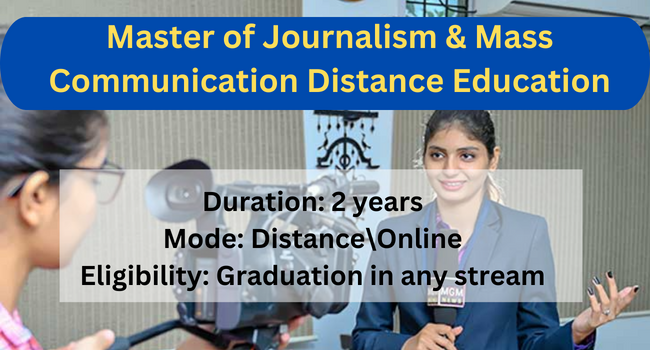Master of Journalism and Mass Communication Distance Education: The distance MJMC course is a well-structured course for working professionals to complete their master’s in the journalism field within their current job. Admission to this course is live for session 2024. The last date for MJMC distance education admission is 30 April 2024 and the registration fee is between INR 300 to 1000.
Master of Journalism and Mass Communication Distance Education Admission 2024
Various UGC-approved universities offer admission to the Master of Journalism and Mass Communication Distance Education program. The top choices are IMTS Institute, Subharti, WCU, IGNOU, and KSOU.
It is a 2-year-long course approved by UGC for distance learning. The eligibility requirement for this course is a graduation grade of 50%. The average fee for the MJMC Distance Education course is INR 30,000 – INR 2,50,000 per year. After completing this course, students have career options like TV correspondent, content writer, public relations, radio jockey (RJ), etc.
Master of Journalism and Mass Communication Distance Education Admission Latest Update (April 2024)
- IMTS Insitute opens its admission portal for MJMC distance education program. The last date to apply for admission is 30 April 2024. Apply Now
- Admission for the Master of Journalism and Mass Communication started at Subharti University. 29 April 2024 is the last date to apply for admission.
- Managalayatan University has started admission for the Master of Journalism and Mass Communication course, academic year 2024. The last date will be 30 April 2024 to apply for admission. Apply Now
Master of Journalism and Mass Communication Distance Education Highlights
| Type of Course | Masters |
| Full-Form of Course | Master of Journalism and Mass Communication (MJMC) |
| Admission Process | Merit-Based/Entrance Exam |
| Study Mode | Distance Education/ Online/ Correspondence |
| Course Duration | 2 Years |
| Age Limit | No specific age limit |
| Minimum Percentage Required | 50% |
| Eligibility | Graduate from a Recognized University or Institution |
| Average Course Fees | INR 30,000 – INR 2,50,000 per annum |
| Similar Course Options of Study | Bachelor of Journalism and Mass Communication, etc. |
| Average Salary Offered | INR 3.5 L per annum |
| Employment Roles | Journalist, News Analyst, Account Executive |
Master of Journalism and Mass Communication Distance Education Eligibility
The basic eligibility criteria to pursue the Master of Journalism & Mass Communication course are as mentioned below:
- Having a bachelor’s degree from a recognized institute or university
- Minimum aggregate percentage ranges between 40-50% depending on the university to which students apply.
- Postgraduate degree holders are also eligible.
Master of Journalism and Mass Communication DDE Admission Procedure
Step 1. The candidate should go to the official website of the college to fill out the admission form.
Step 2. The details in the application form should be filled in correctly. Otherwise, the form will be cancelled.
Step 3. The payment of application fee + entrance exam fee can be paid through Net banking/Credit cards/Debit cards.
Step 4. The payment can also be made through the bank e-challans.
Step 5. The registration confirmation details to the candidates will be delivered through e-mail and SMS.
Documents Required For Admission to Master of Journalism and Mass Communication DDE
- Adhaar card
- Pan card
- 10+2 & UG certificate
- D.O.B. certificate
- Domicile
- Caste certificate
Master of Journalism and Mass Communication Distance Education Syllabus
The Master of Journalism and Mass Communication Distance Education programme takes two years and is split into four equal parts called “semesters.” Its curriculum has compulsory core subjects and many optional subjects. Here is the entire syllabus for the Master of Journalism and Mass Communication Distance Education.
| 1st Year | |
| Semester I | Semester II |
| Basic Principles of Communication | Communication Development |
| History and Development of Mass Media | Media Management |
| Media Laws and Ethics | Media and Society |
| Computer Applications for Media | Advertising and Public Relations |
| Reporting and Editing | Electronic Media (Radio and TV) |
| Professional Writing | Advertising (Practical) |
| Communication Theory | Photography |
| Print Journalism Practice | PR & Corporate Communication |
| 2nd Year | |
| Semester III | Semester IV |
| International Communication Rural Communication | New Media |
| Reporting and Editing for Electronic Media | Media and Human Rights |
| Internship | Environment Communication |
| Intercultural Communication | Study Tour & Reporting |
| Radio and TV Production | Communication Research |
| Media Management | Media Laws and Ethics |
MJMC Distance Education Career Opportunity
| Govt. Sector | Private Sector |
| TV Correspondent | Fashion Photographer |
| Screenwriter | Film Director |
| Special Correspondent | Radio Jockey |
| Editor | Event manager |
| Sound Mixer and Sound Recorder | Art Director |
| Public Relations Officer | Sound Engineer |
| Producer | Academician |
| Media Researcher | Anchor/Announcer |
| Content Researcher | Sports/Crime Journalist |
Master of Journalism and Mass Communication Distance Education Top Colleges
| University/College Name | Location/Area |
| Savitribai Phule University | Pune |
| Bharathiar University | Coimbatore |
| Alagappa University | Kalaikudi |
| Utkal University | Bhubaneswar |
| Guru Gobind Singh Indraprastha University | New Delhi |
| Rabindranath Tagore University | Bhopal |
| Maharaja Sayajirao University of Baroda | Vadodara |
| Babasaheb Bhimrao Ambedkar University | Lucknow |
| St. Wilfred’s PG College | Jaipur |
| Indira Gandhi National Tribal University | Anuppur |





